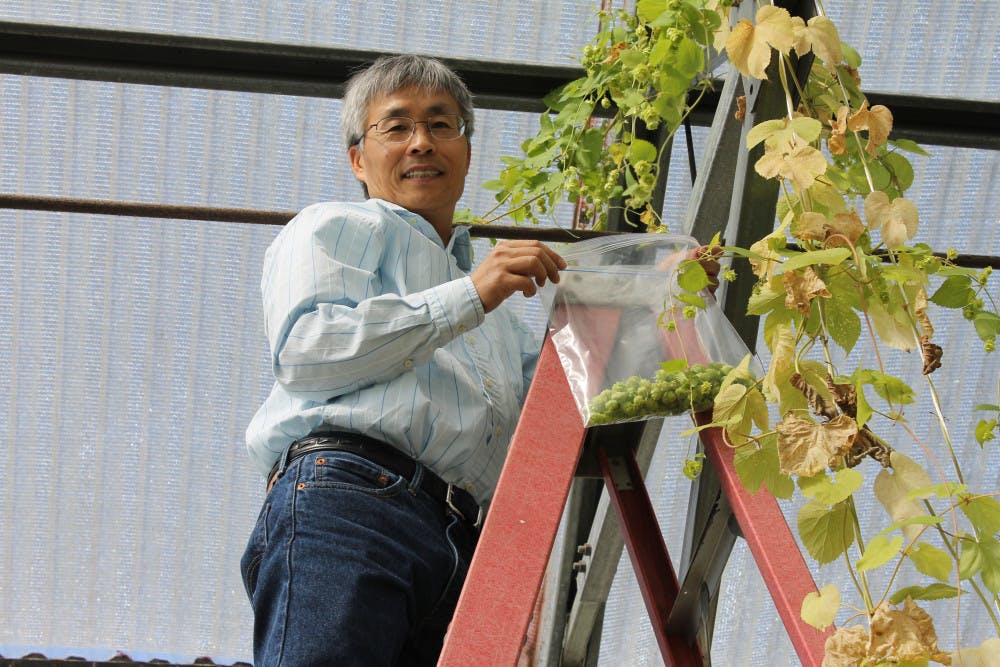Crop-damaging parasites have invaded Florida’s hops industry, but UF scientists are working on a solution.
Nematologist Johan Desaeger said the root-knot nematode is causing issues for hops growers by infesting the plant’s root system. This causes the hops to turn from yellow to green and have stunted growth.
This is one of the biggest worm problems Desaeger has ever seen in his 20 years of studying nematology.
Hops are a flower primarily used in beer production as a flavoring and a stabilizer in the brewing process. They can add a bitter, citric or even zesty taste to beers, such as in India pale ales.
After noticing the crops’ yellowing and stunted growth, he checked the plants’ root systems and found numerous sores on them, a tell-tale sign that the root-knot nematode was the culprit, Desaeger said.
This type of worm is a microscopic creature about half a millimeter in size, no thicker than a thread. Florida’s sandy soil creates an ideal living condition for the nematode, and because the temperature in Florida is warm year-round, there aren’t enough cold spells to periodically kill the nematodes.
Since there isn’t a way to fully get rid of the parasite, they can only manage the problem, Desaeger said. The key to ensuring that nematodes aren’t a problem is eradicating the worms beforehand by fumigating the soil and spraying pesticides on the crop beds.
Along with Desaeger, professor Zhanao Deng and assistant professor Shinsuke Agehara are also working on growing hops in the state efficiently.
The hops are being grown at the Gulf Coast Research and Education Center in Wimauma, Florida. The project started in summer 2016 when the worm problem was first noticed.
Hops are a relatively new crop to Florida, as the climate of the state isn’t the best for their growth. In the U.S., hops are primarily grown in the Pacific Northwest.
The goal with growing hops in Florida is to possibly be able to get two harvests a year, one in June and another in November.
The amount of hops produced has steadily increased over the past couple harvests, Deng said. The Cascade hops have grown best, producing four pounds of the flower per plant. That equals about 2,000 pounds an acre, up from the 700 pounds that were collected in 2016, he said.
LED lights standing on 20-foot-tall poles were placed above the hop beds to artificially extend daylight. Hops need about 16 hours of daylight to grow at peak performance, Deng said.
This is another reason why Florida isn’t the best state for growing hops. The longest day in Florida is 13 hours long, opposed to the 15-hour days states like Washington and Oregon experience.
Since Wimauma is only about 30 minutes south of Tampa, Desaeger said they’ve been receiving support from Tampa breweries such as Cigar City Brewing and 3 Daughters Brewing. However, there aren’t any Gainesville breweries involved in the project.
Cypress & Grove Brewing Company cellarman Ryan Griffith and marketing director at Swamp Head Brewery Brandon Nappy said both breweries use hops from the Pacific Northwest.
The hops industry in Florida isn’t up to par with those in the northwestern part of the country, Nappy said. Swamp Head Brewery uses a large number of hops in brewing, and the amount grown in Florida at this time is not enough to meet demand.
Nappy said he was unaware of the issue hop farmers in the state are facing and has not spoken with any farmers in a while. He said the brewery has used Florida-grown hops before but only in novelty beers.
“We’ve used them in the past,” Nappy said, “and would love to continue to use them.”
Zhanao Deng is one of the University of Florida scientists working on limiting the nematode problem in the state. Currently, Cascade hops have been the most successful.






